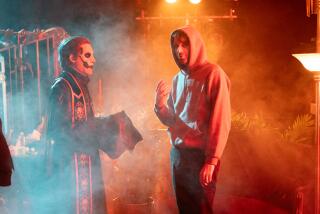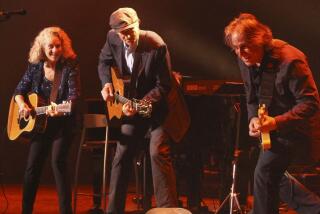Califone frontman Tim Rutili gets an on-set lesson in filmmaking
- Share via
Tim Rutili, the frontman of the earthy, experimental folk act Califone, has several superstitions regarding making music and playing it live. Some he won’t divulge but others he tells with a wry sense of amusement. “If the sound check is really good, it’s going to be a crappy show so sometimes I try to sabotage sound check,” he said in an interview last week from Seattle, the first stop on the band’s West Coast tour.
He also can’t eat before a show and during the making of any big endeavor, including the band’s nine albums, he loses something important, like a notebook or computer files.
His most recent undertaking proved the exception: For the making of the film “All My Friends Are Funeral Singers,” a companion piece to Califone’s album by the same name, Rutili didn’t lose anything.
Screening tonight at the Hammer Museum with the band performing a live score, “All My Friends Are Funeral Singers” is the story of Zel (Angela Bettis), a psychic living in a country house occupied by ghosts. The project, which is Rutili’s first feature as a writer-director, also is set to screen next month at the Sundance Film Festival.
The music for “Funeral Singers” came to Rutili as he was filming friends and family, asking them about their superstitions -- his grandfather throws salt on the ground after an unwanted visitor leaves. Inspired by images mentioned in the interviews, he began writing song fragments and then a short story developed.
Rutili had shot many Califone music videos and short films and had worked on soundtracks. He saw this as his opportunity to try features. In September 2008, he started a screenplay based on what he initially described as a “weird little children’s story,” splitting his days between screenwriting and writing the album. “I’d send demos of songs and little bits of the screenplay to the band,” said Rutili, who divides his time between family in L.A. and Tempe, Ariz., and his quartet in Chicago.
“When things clicked, it was great, but it was aggravating sometimes because I wasn’t sure how it was going to come about,” Rutili said.
The tale grew darker as the pieces came together. After Rutili joined bandmates Jim Becker, Joe Adamik and Ben Massarella in Chicago, more songs and characters for the album and the film grew out of the recording session with longtime producer Brian Deck.
Rutili had the screenplay completed by December but continued to tinker with it until production began at a friend’s Indiana house in April. Working with a $30,000 budget on an 11-day shoot, Rutili didn’t let his relative inexperience worry him too much, but he did have a rough first day.
“It was a group scene and I thought, ‘Oh, no.’ I didn’t really know what I was doing,” he said. “Someone would ask me a question and I’d say, ‘I don’t know.’ From that day on, I woke up an hour early so I could figure out what needed to be done.”
Drawing on the 1970s Spanish drama “The Spirit of the Beehive” for ideas about mood, Rutili imparted a dream quality to “All My Friends Are Funeral Singers.” The house was packed with colorful knickknacks that he, production designer Joe Bristol and friends acquired from thrift stores.
Despite the heavy themes of the afterlife and death, Rutili’s ghosts -- including his own band, often seen making a ruckus in a spare bedroom -- are good-humored, chattering about sex and vaudeville.
“All My Friends Are Funeral Singers,” both the album and film, share a preoccupation with cinema: songs like “Bunuel” offer a rustic take on the famous Surrealist with backing vocals from Iron & Wine’s Sam Beam.
Rutili relies on his primitive resourcefulness to create purposeful magic. “If a room is filled with junk,” he said, “we’ll find a way to get a certain quality out of it.”
margaret.wappler@latimes .com
More to Read
Only good movies
Get the Indie Focus newsletter, Mark Olsen's weekly guide to the world of cinema.
You may occasionally receive promotional content from the Los Angeles Times.









